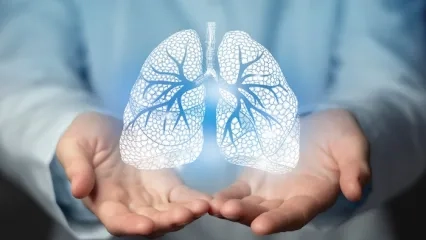Alo Yeditepe
Alo Yeditepe
Do Dental Caries Increase the Risk of Pneumonia?
Stating that pneumonia is a serious infectious disease that threatens public health, Chest Diseases Specialist Prof. Dr. Banu Musaffa Salepçi said, “Oral health and hygiene are very important in terms of body resistance, dental caries increase the risk of pneumonia.”
The World Health Organization (WHO) declared 12 November as 'World Pneumonia Day' to draw attention to the fight against pneumonia worldwide. Yeditepe University Hospitals Chest Diseases Specialist Prof. Dr. Banu Musaffa Salepçi, who made a statement on the occasion of World Pneumonia Day, gave information about the disease and made warnings.
Stating that the bacteria in the oral flora multiply and cause pneumonia as the body resistance decreases, Prof. Dr. Salepçi said, “Everyone has these bacteria but in lesser numbers. With the decrease in body resistance and weakening of the immune system, bacteria multiply and reach the lungs, causing pneumonia. The decrease in body resistance in cold weather and the breakdown of the defense mechanisms of the respiratory tract also increase the risk of pneumonia. Passive smoking in children is also a cause of pneumonia, so parents should never smoke near their children. They should also pay attention to children's oral hygiene and brushing their teeth.”
28 Out of a Thousand People Get Pneumonia Every Year
Stating that pneumonia ranks first among the causes of death for children under the age of 5 worldwide, Prof. Dr. Salepçi said, “It is the most important infectious disease that causes death in adults over 65 years of age. Pneumonia, which presents as fever, cough, sputum production, sometimes chest pain, and, when very widespread, shortness of breath, is one of the most common lung diseases. Pneumonia is seen in 2 to 15 of 1000 adults in the world every year. In Turkey, pneumonia is seen in 3 to 11 of 1000 adults per year. With the availability of antibiotics and the routine administration of the vaccine, there is a decrease in pneumonia-related deaths in children, but this rate did not change in advanced age. Half of those hospitalized for pneumonia, especially those over the age of 80, lose their lives. As the elderly population has increased in the world, both the incidence of pneumonia and the mortality rate related to pneumonia have increased. 50% of deaths in intensive care units are due to pneumonia.”
Childhood Pneumonia Causes Permanent Damage to the Lung
Stating that everyone can get pneumonia, but the incidence is higher in risk groups, Prof. Dr. Salepçi said, “When the body's resistance decreases following influenza infection, people can get pneumonia. Especially after childhood pneumonia, lung damage may remain. Enlargement of the airways and lifelong recurrent infections lead to solidification of the lungs over time. It can cause permanent damage to the lungs and loss of volume. Chronic lung disease may develop after severe pneumonia in adulthood.”
Elderly People with Chronic Diseases Are at Risk
Prof. Dr. Banu Musaffa Salepçi, listing the risk groups, made the following statements: “Citizens over the age of 65 are in the risk group of diabetes, chronic heart, cancer, and lung diseases. Also, those who take medications that suppress the immune system are at risk. For example, medications used by people with rheumatic diseases. The risk of pneumonia is also increased in people who have a disease that requires long-term use of cortisone, have their spleen removed, and use alcohol and cigarettes.”
"Those in the Risk Group Should Get the Pneumonia Vaccine"
Emphasizing the need to avoid smoking, Yeditepe University Hospital Chest Diseases Specialist Prof. Dr. Banu Salepçi said, “We should also use alcohol as little as possible. The pneumonia vaccine is very important, especially for those under the age of 5 who have been vaccinated in the 2, 4, 6, and 12 months since 2008, with the instructions of the Ministry of Health. As of January 2019, only the vaccine in the 6th month has been removed. We protect children with vaccines. For adults, it is given primarily to those aged 65 and over. Even if there is no health problem, it is recommended that everyone over the age of 65 should be vaccinated against pneumonia. Apart from that, no matter how old they are, those in the risk group should be vaccinated.”
Explaining that pneumonia is very common in children in African countries, Prof. Dr. Salepçi said that the reason for this is malnutrition, adding that malnutrition also increases the risk of pneumonia in neglected and orphaned adults.
Press Coverage: ntv.com | cnnturk.com | gazetevatan.com | cumhuriyet.com | hurriyet.com | odatv4.com | haberler.com | sozcu.com
About
Faculty and Year of Graduation:
İstanbul University, Çapa Faculty of Medicine, 1984
”
See Also
- What is Tuberculosis (TB)? Symptoms and Treatment
- Circadian Rhythm Disorder
- What is Good for Cough? How to Cure Cough?
- What Should Asthma Patients Be Cautious About?
- Does Poor Quality Sleep Increase The Risk of Asthma?
- What is Allergy? What are Allergy Symptoms?
- COPD Makes You Age Early
- It Is Aimed to Eliminate Tuberculosis Worldwide By 2030
- Pollen is Now Seen Outside of Seasonal Changes
- Smoking Rates Under the Age of 15 Are Increasing
- Inhaling Electronic Cigarettes for a Few Minutes Causes Damage to Vein Wall
- People Who Smoke More Than 25 Cigarettes a Day Have a 50-fold Increased Risk of Lung Cancer
- Can Back Pain Be A Sign of Lung Cancer?
- Nine Out of Ten COPD Patients Do Not Know They Are Sick
- Quitting Smoking Even After Diagnosing Lung Cancer Effects Lifespan
- Electronic Cigarettes Can Cause Heart Attacks!
- Pollen Allergy Has No Season
- Beware of Little-Known Risks of Smoking!
- Lung Cancer
- Does the Pneumonia Vaccine Protect Against the Coronavirus?
- In Case You Are Unable To Sleep Even If You Are Tired, Your Circadian Rhythm May Be Disrupted
Alo Yeditepe




